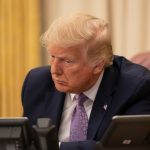Recently, President Trump caused quite a stir during a visit to a McDonald’s in Pennsylvania, where he donned an apron and took on the role of a fast-food employee. This unexpected career change was met with excitement from enthusiastic customers and, as usual, was met with mixed reactions from the press. Trump’s entrance into the golden arches, where he humorously pretended to work the fry station, painted a vivid picture of retail politics that many found refreshing.
As he greeted customers, some were practically starstruck, blurting out their gratitude and admiration. With his trademark charm, Trump handed out orders, claiming they were “compliments of Trump,” reminding everyone of his charisma. Customers seemed delighted, and it was evident that seeing a former president in a fast-food setting was a moment to remember for many. It wasn’t just a publicity stunt but a demonstration of accessible leadership that spoke volumes to everyday Americans.
Trump’s light-hearted jab at Vice President Kamala Harris, referring to her past claims of working at McDonald’s, added fuel to the fire. He pointed out that her story, which she claims occurred in the summer of 1983, was not true—making for a juicy tidbit that likely resonated with many who appreciate honesty in politics. This playful exchange underscored a fundamental political strategy: to relate to the common worker, and working at McDonald’s symbolizes the American dream for countless individuals.
Despite the potential for criticism, Trump’s McDonald’s visit was hailed by supporters as an example of good old-fashioned retail politics. It wasn’t just about flipping burgers; it was a bold move highlighting the dignity of all jobs, regardless of their status. The liberal media, however, didn’t quite see it that way. Many commentators suggested this was merely a staged event, trying to create a spectacle from what they deemed insincerity. Critics claimed that Trump was pretending to engage with voters disingenuously, but this event felt genuine and relatable for supporters.
The backlash from news outlets, pointing fingers at every little detail of the afternoon, only seemed to amplify Trump’s message. In a world where most politicians opt for stiff suits and stuffy events, Trump’s McDonald’s cameo was a striking contrast to the typical campaign stop—highlighting his dedication to connecting with average Americans. As he serves up fries, he’s also serving up a reminder that no job is beneath anyone and that hard work deserves respect, no matter where it happens.
In the end, whether it’s fries or fancy suits, the real takeaway from this fast-food escapade is that Trump’s approach to politics emphasizes connectivity, relatability, and respect for labor. It’s no wonder many citizens feel attached to him; he knows how to reach people where they are, and doing it at McDonald’s was just the cherry on top of a delightful political sundae. In the grand scheme, such moments may not change history. Still, they certainly make for entertaining and memorable political narratives that stick with voters long after the fries have been eaten.




